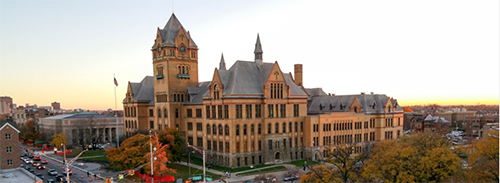Detroit’s Wayne State University is participating in a national effort by 130 public universities and systems to increase college access, close the achievement gap, and award hundreds of thousands of degrees by 2025. The participating institutions will work in clusters of four-12, and WSU President M. Roy Wilson will lead a cluster of 11 urban universities.
Together, the institutions enroll about 3 million students, including 1 million who receive Pell Grants, or federal grants for college. The Association of Public and Land-grant Universities (APLU) is organizing the effort, which is called Powered by Publics: Scaling Student Success.
“Over the past few years, we’ve witnessed a real and growing enthusiasm among public university leaders to advance college completion nationally,” says Peter McPherson, president of APLU. “We have to seize the moment and mobilize institutions to improve not just college access, but also equity in student outcomes and the number of students who earn degrees. That’s what Powered by Publics is all about and why we’re thrilled to work with our member institutions toward such an important national goal.”
The project is the largest-ever collaborative effort of its kind. Participating institutions will share aggregate data demonstrating their progress in the initiative.
“To meet the demand for college-educated workers, we need to provide access to education for all potential graduates, including transfer students, as well as those students who are at-risk, such as first-generation college students,” says Wilson. “This has the double benefit of increasing our educated workforce and helping students around the country — including from Michigan — become productive citizens.”
The institutions are diverse, which is expected to help create adaptable student success reforms that can be used at many universities. The participating institutions reflect a wide array of characteristics in enrollment, student demographics, regional workforce needs, and selectivity.
The clusters have identified focus areas for their work. For example, one is working to integrate data collection systems to better monitor student progress. Another will focus on financial aid and financial literacy, while another will integrate career advising early on.
The effort will be overseen by APLU’s Center for Public University Transformation, which the association created this year. The center will send out lessons learned from the participating institutions.
The center will have a national advisory council that will provide strategic vision and guidance.






